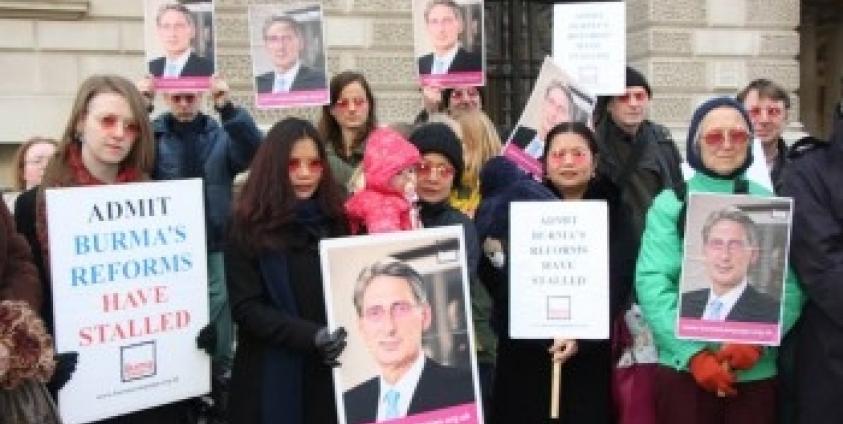A campaign by the Burma Campaign UK is trying to highlight ongoing human rights abuses in Burma.
To make its point, Burma Campaign has delivered more than 2,000 rose-tinted glasses, and issued photo petitions to the British Foreign Office to put pressure on the British government to a “return to putting human rights as their top priority in Burma,” the group said.
Rose-tinted glasses hand-in at British Foreign Office 3rd February 2015“For too long, the British government has viewed Burma through rose-tinted glasses, and based policy on the broken promises of President Thein Sein. They should instead accept that human rights violations in Burma are increasing and put pressure on the military-backed government in Burma to deliver genuine reforms for democracy in Burma.” Anna Roberts, Executive Director at Burma Campaign UK, said in a statement.
“Over the past 18 months, thousands of people have taken action in support of our campaign to deliver rose-tinted glasses to Foreign Secretary Philip Hammond, to highlight how the British government takes a rose-tinted view of the situation in Burma,” Burma Campaign UK added.
The human rights advocacy group pointed out that the number of political prisoners had risen “five-fold” to 160 since 2011, and noted that reports of the rape and murder of civilians by the Burma Army continued to emerge.
“The British government must admit that reforms in Burma have stalled and return to a policy that makes human rights, not trade deals, the priority”, Mrs Roberts added.
Baroness Kinnock, Chair of the All Party Parliamentary Group for Democracy in Burma and who is involved in the campaign maintained that Britain was not doing enough to pressure Burma’s military-backed government to continue with democratic reforms.
“We are extremely concerned over the British government’s policy on Burma. We would like to see a much more robust policy based on the promotion of human rights and genuine democracy,” she said.
The Burma Campaign UK’s statement comes as Burma’s government was criticised by Human Rights Watch for going backwards on human rights in 2014.
HRW’s, 2015 World Report cited the widespread persecution of Burma’s ethnic Rohingya, the military’s ongoing dominance of the country’s political system, and little notable improvement in government transparency before the planned 2015 Presidential elections.
“After two years of steady if uneven progress, Burma’s human rights situation was a car crash in 2014,” Brad Adams, HRW’s Asia director said as the report was released.








